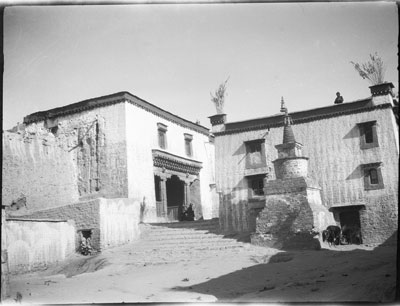
BMH.E.76.1 (Film negative)


BMH.E.76.1 (Film negative)

Arthur Hopkinson
A. J. Hopkinson
December 31st 1927?
Gyantse > Palkhor Chode
BMH.E.76.1
85 x 110
Negative film nitrate
A. J. Hopkinson's Tour of Duty as British Trade Agent, Gyantse, 1927-28
Notes on print/mount - One contact print made from this negative is contained in A. J. Hopkinson's negative case with the negative. The caption "Entrance to Gyantse monastery" has been written on the back of the print in pencil, as have the references 'E-76' and 'H.43' [MS 31/07/2006]
Manual Catalogues - [Caption in A. J. Hopkinson's negative album 'Tibet E']: 'Entrance to Palkhor Choden' [MS 04/05/2006]
Other Information - Dates: For dating of image, see A. J. Hopkinson Archive, OIOC British Library, Mss Eur D998/54, Journal Letters from Gyantse and Various Camps, 1927-28, commencing December 30th 1927, Gyantse, pages 4-5 [MS 31/07/2006]
Other Information - Dates: This photograph was probably taken on December 31st 1927. On this day Hopkinson commented in his journal that his ponies had to be rested and “so I went photographing round Gyantse ... some people came up and asked me to go into their house to photo them. ... I was amused to find the walls papered by 1927 Weekly times editions - bought they said at the Fort. Also there was a photo of a Tibetan who’d been to England, got up in cowboy style, with chaps, on a huge artificial horse this shape [line drawing inserted in text]. I also photod [ sic ] some rather jungly Kham-bas, going on pilgrimage from Kham via Lhassa to Shigatse. It took three months they said from Kham to Lhassa, and they expected me to produce the picture immediately I had pressed the button” [A. J. Hopkinson Archive, OIOC British Library, Mss Eur D998/54, Journal Letters from Gyantse and Various Camps, 1927-28, commencing December 30th 1927, Gyantse, pages 4-5] [MS 04/08/2006]
For Citation use:
The Tibet Album.
"Entrance to Palkhor Chode, Gyantse"
05 Dec. 2006. The British Museum.
<http://tibet.prm.ox.ac.uk/photo_BMH.E.76.1.html>.
For more information about photographic usage or to order prints, please visit the The British Museum.
© The British Museum